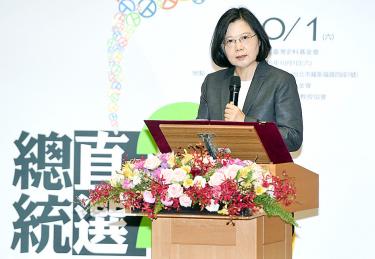Although Taiwan faces Beijing’s obstructionism when “going outward,” “the efforts we make every time we meet challenges will accumulate” for the world to see the nation’s determination, President Tsai Ing-wen (蔡英文) said yesterday.
Tsai made the remarks at a seminar in Taipei hosted by the Wu San Lien Foundation for Taiwan Historical Materials marking the 20th anniversary of Taiwan’s first direct presidential election.
“Twenty years have passed since the first direct presidential election. In the process of deepening our democracy, Taiwanese use their ballots to make peaceful and stable government transitions: A phenomenon that sent authoritarianism to the dustbin of history and keeps those in power on their toes,” she said.
However, Taiwan, despite its democratic achievements, is beset with aggravating structural problems, such as pension reform, long-term care service, industrial transformation and labor rights, Tsai said.
“Facing the challenges squarely has made the administration’s governance in the past few months a bit bumpy, but blowbacks are expected when you are opening pressure cookers one by one,” she said.
Tsai promised to lead the nation through the reforms, as they are “historical responsibilities” that need to be shouldered.
“Taiwanese held direct presidential elections 20 years ago amid a tempestuous storm [of Chinese missiles],” Tsai said. “Twenty years later, Taiwan is continuing on the course of democratization, on the basis of which a prosperous, safe and just society will be built.”
“Taiwan also has to go outward and that is why I visited our allies right after I took office,” Tsaid said. “Besides consolidating the friendship with our diplomatic allies, the visit by a democratically elected president also made the world see Taiwan and its 23 million people’s love for democracy, freedom and human rights.”
China has been using its influence to obstruct Taiwan’s participation in international organizations, as it did with the International Civil Aviation Organization (ICAO) Assembly, but this is the reality that Taiwan faces, Tsai said. “These kinds of challenges and difficulties are expected to continue, but Taiwan’s efforts will also endure.”
“In the ICAO incident, the world has seen Taiwan’s endeavors, with many nations, regardless of whether they have diplomatic relations with us, expressing their support for Taiwan’s participation. We will build substantial cooperative relationships with other nations based on sincere friendship, and when we take up the role of a key participant in global affairs, we cannot be, and will not be, ignored by the world,” she said.
Tsai also thanked the foundation for undertaking an oral history project for the Democratic Progressive Party’s 30th anniversary celebrations.
Foundation chairman Wu Shuh-min (吳樹民) said that with a “bad neighbor” that represses Taiwan in every possible way, “we hope the public will have the wisdom to resist Chinese hegemony and the government could lead Taiwanese through transitional justice to a Taiwan that is a normalized nation with the right name and a [new] Constitution.”
Since the 1980s there were calls from the dangwai (黨外, those “outside the party”) for direct presidential elections, as it would demarcate — as it has demarcated — the boundaries of the nation and the boundaries of its people as nationals, said Cheng Ching-jen (鄭欽仁), a retired history professor from National Taiwan University.
The seminar was held yesterday, as Oct. 1 is also the National Day of the People’s Republic of China, foundation secretary-general Tai Pao-tsun (戴寶村) said. “We hope [China] can one day choose their leaders with votes, instead of clapping hands, and then the two nations can finally sit down and talk.”
Source: Taipei Times - 2016/10/01





















